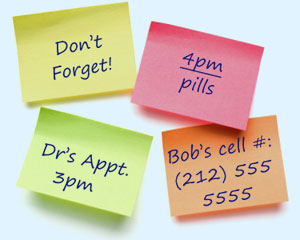The other day, I took my cat to the vet. When we were done, I needed some prescription cat food from the practice’s pharmacy, and the vet’s assistant offered to collect it and meet me at my car. But then she wanted a description of the car.
“It’s a blue—”
And that was as far as I could get. I knew perfectly well that I drive a Mazda, but the word had temporarily decamped from my 86-year-old brain.
I hate senior moments. I know they’re a normal glitch of aging, but they remind me that, especially at my age, dementia is a possibility.
Besides senior moments, my memory has slipped in other ways. I have more trouble now remembering the things I need to do. I’ve always started my mornings with a to-do list, but there’s a lot more on it now. The list used to encompass just the day’s appointments. I trusted my memory to remind me of things like “go to the cleaner” or “call the piano tuner.”
That was then. Now, my desk is festooned with stickies that have scribbled-down reminders like “sort the laundry,” stuck on where I can’t miss them.
Another thing: for decades, I’ve kept a kind of journal—bits and pieces, descriptions of incidents in my life that I might include in a memoir someday, written just for my family. When I reread those now, I’m amazed at the details I could remember 10 or 20 years ago about events that occurred in my childhood or when I was a young adult—details I no longer recall. It’s as if my memories have had most of their wrinkles ironed out.
I’ve done research on memory and found some comfort in learning that, according to the latest theories, it’s the brain’s job to scrub away details. The nitty-gritty in our memories doesn’t just fade over time. The brain gets rid of trivia, possibly while we sleep, because all we really need to remember to act effectively in the future is the gist of things, and that’s mostly what gets stored in long-term memory.
So I seem to have a headful of gists. And maybe that’s not such a bad thing.
There are ways to cope with most of the memory inconveniences that come with aging, problems like losing things. To avoid that, I always park important items in the same places. For example, my apartment keys spend the day in my pants pocket, and they overnight in a box on my dresser. When I’m not wearing my distance glasses, they’re in a glasses-holder either on my desk or in the living room.
I’ve learned that remembering some things takes a conscious effort. For instance, when I park my car in a huge parking lot, I stop for a minute and memorize the row number or, if there isn’t one, some other cue, like “It’s in the row opposite the fire door.”
That works, but when I meet people for the first time, no amount of effort will preserve their names in my overcrowded brain. For now, the fact that we all wear masks gives me an excuse for not remembering, and I use it, but before masks, I had to wing it. It helps that I live in a retirement community, so the chances are, the other person won’t remember my name either.
Here’s something that can happen at any age: you walk into the kitchen (or any other room) to get something and then can’t remember what you came for. Scientists say the problem is that you passed through a doorway to get into the room. Doorways seem to trigger a reset in the brain, which drops previous thoughts to be ready for something new. But I have found a solution. If I go back to where I was when I decided to go to the kitchen and then just stand there, making my mind a blank, I can usually recall what it was that I wanted to fetch.
Mostly, having a lagging memory in later life is irritating, but there’s at least one good thing about it. It can help cement a kind of bonding among friends in the same generation. When one of us has a senior moment and can’t recall the name of a film we loved or an author whose books we admire, all of us know what’s happening, and we pitch in to help fill in the blank. Nobody is self-conscious because it happens to all of us, and tackling the problem jointly is like playing charades.
Of course, none of this does much to ease the big worry of later life, which is dementia, but one piece of information I picked up offers a tidbit of reassurance. Two to three years before developing dementia, many people lose any awareness that they’re having memory problems (though the problems may be obvious to others).
So as long as I keep worrying that I might be developing dementia, I’m probably not.

Flora Davis has written scores of magazine articles and is the author of five nonfiction books, including the award-winning Moving the Mountain: The Women’s Movement in America Since 1960 (1991, 1999). She currently lives in a retirement community and continues to work as a writer.



